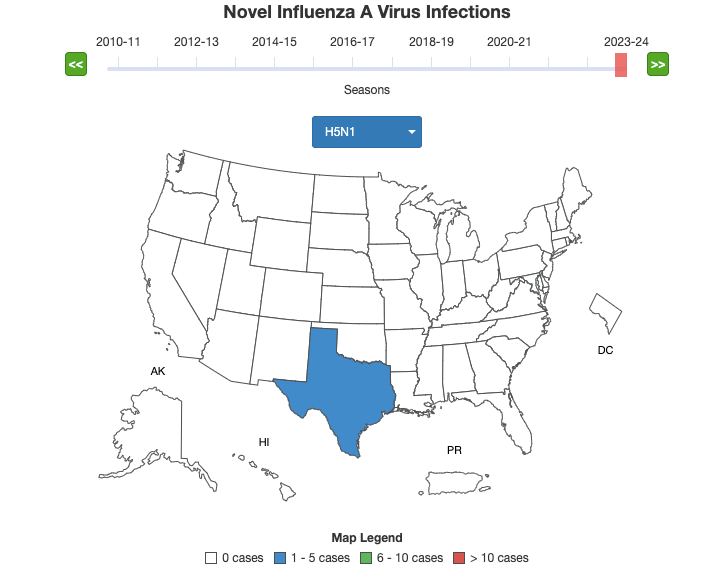CDC launches new dashboard to track bird flu outbreak in your area
Influenza A has been tested across hundreds of wastewater sampling sites and their data mapped

Your support helps us to tell the story
From reproductive rights to climate change to Big Tech, The Independent is on the ground when the story is developing. Whether it's investigating the financials of Elon Musk's pro-Trump PAC or producing our latest documentary, 'The A Word', which shines a light on the American women fighting for reproductive rights, we know how important it is to parse out the facts from the messaging.
At such a critical moment in US history, we need reporters on the ground. Your donation allows us to keep sending journalists to speak to both sides of the story.
The Independent is trusted by Americans across the entire political spectrum. And unlike many other quality news outlets, we choose not to lock Americans out of our reporting and analysis with paywalls. We believe quality journalism should be available to everyone, paid for by those who can afford it.
Your support makes all the difference.A new dashboard to monitor the spread of bird flu has been released by the Centers for Disease Control and Prevention (CDC), as rates rise among dairy cows across the US.
The health agency draws on data from wastewater sampling sites that have tested positive for influenza A.
The newly-curated dashboard, released on Tuesday, presents the data in map form and compares positive tests in a region to the same time last year.
As of 4 May, the dashboard shows that higher-than-average levels of the virus have been detected at 189 wastewater sites across the country.
Upticks, however, do not necessarily mean that bird flu has passed between animals and humans as type A cases of flu are prevalent and make up approximately 70 per cent of cases in people. According to the CDC, no unusual upticks in flu-like illnesses have been recorded in recent weeks.
The dashboard can’t yet distinguish whether high levels of the virus in wastewater indicate infections in humans, cows, birds or other animals.

It follows an outbreak of bird flu strain H5N1, a subtype of influenza A that is circulating in cattle across the US. According to the dashboard, the risk of avian flu to the public remains low.
The US Department of Health and Human Services announced last week that it would pay farms $28,000 each to allow officials on-site to test cattle for bird flu to persuade more farmers to come forward.
One location in Saline County, Kansas, showed upticks of the avian flu for this time of the year. Four herds in Kansas tested positive in April, the CDC said.
It’s unclear whether the Kansas wastewater samples were limited to human waste or whether they included runoff water from farms.
“We’d really like to understand what might be driving that influenza A increase during what we consider the lower transmission season for influenza A,” Jonathan Yoder, deputy director of the CDC’s division of infectious disease readiness and innovation, told NBC.
According to the dashboard’s latest update on Tuesday, 42 herds in nine states had been affected. States include Kansas, Colorado, Idaho, Michigan, New Mexico, North Carolina, Ohio, South Dakota and Texas.
The CDC is currently monitoring 260 people who have been exposed to dairy cows infected with H5N1. Thirty-three have been tested; one has been diagnosed with bird flu connected with the cattle outbreak.
On 1 April, a Texas dairy worker tested positive for H5N1 and later developed a severe case of conjunctivitis and has since recovered. He marks the second ever case recorded in the US, with spread from person to person never recorded.
As it stands, the risk to the general public is low, scientists say. While cases are rare, of the 873 humans that have been infected with H5N1 globally over the past 20 years, 458 have died, according to the World Health Organisation.
Symptoms in humans can range from non-existent to very mild, all the way through to death in the instance of severe disease, according to the CDC.
Join our commenting forum
Join thought-provoking conversations, follow other Independent readers and see their replies
Comments